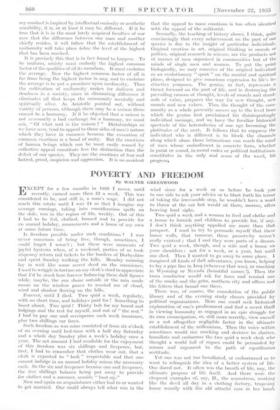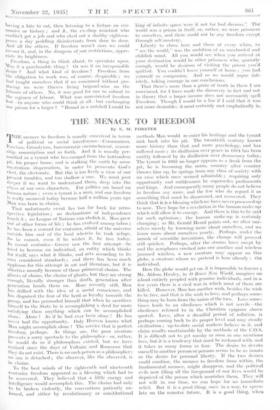POVERTY AND FREEDOM
By WALTER GREENWOOD
EXCEPT for a few months in 1929 I never, until recently, earned more than £2 a week. This was considered to be, and still is, a man's wage. I did not reach this estate until I was '24 so that I imagine my average earnings, taking into consideration spells on the dole, was in the region of 25s. weekly. Out of this I had to be fed, clothed, housed and to provide for ail annual holiday, amusements and a home of my own at sonic future time.
• Is freedom possible under such conditions ? I was never conscious of being free,' though, sometimes, I could forget I wasn't ; but these were moments of joyful hysteria when, of a weekend, parties of us took s'i'xpenny return rail tickets to the borders of Derbyshire and spent Sunday walking the hills. Monday morning lay in wait like some secret deed on the conscience. I used to wriggle in torture on my clerk's stool to appreciate that I'd be stuck here forever balancing these daft figures while;• maybe, the sun shone outside or the rain made music on the window panes to remind me of cloud, Wind and shadow fleeting on the hills. ' Forever, until - I died. • Two • quid a - week, regularly, with no short time, and holidays' paid for ! Something 'to boast about. Two quid ! Thirty bob for my board and kidgingS and the rest for myself, and Out of " the red " I had to. pay one and sevenpence each week insurance, plus' two Shillings car fares.
• Such freedom as was mine consisted of from six o'clock of an evening until bed-time with a half day Saturday and a whole day -Sunday plus a week's holiday once a year. The net amount I had available for the enjoyment of this freedom was six shillings and fivepence, but, first; I had to remember that clothes wear out, that a clerk is expected to " look " respectable and that one cannot indulge in an annual holiday minus the necessary cash. So the six and tivepence became one and fivepence, the five shillings balance being put away to provide for clothes and a summer, seaside " buSt-hp."
• Now and again an acquaintance either had to or wanted to get married. One 'could always tell what was in-the wind since • for a week or so before he took you to one side to ask your advice or to blurt forth his terror of taking the irrevocable step, he wouldn't have a word to throw at the cat but would sit there, morose, often heaving loud sighS. Two quid a week and a woman to feed and clothe and a house to furnish and. children to provide for, if any. I don't think anything appalled me more _than that prospect. I used to try to persuade myself that these hOuse walls, that tramcar, these passers-by weren't really existent ; that I and they were parts of a dream. Two quid a week, though, and a wife and. a house on your shoulders : not for a week, or a year, but until one died. Then I wanted to go away to some place. I imagined all kinds of daft adventures, you know, helping to lay a pipe line in Iraq (wherever that was), or ranching in Wyoming or Nevada (beautiful names !). Then the train conductor would ask for fares and remind one of the smoke and the grim, northern city and offices and the fetters that bound one there.
There was, 'of course, the consolation of the public library and of the evening study classes prOvided by political organisations. Here one could seek historical eXplanation of one's predicament and find a secret thrill in viewing humanity as engaged. in an epic struggle for its own emancipation, or, still more secretly, view oneself as a not altogether negligible factor in the ultimate establishment of the millennium. Then the voice within sometimes would rise mocking and derisive to shatter, humiliate and embarrass the two quid a week clerk who thought a world full of rogues could be persuaded by reason and 'argument to the path of equalitarian rectitude.
Yet one was not too humiliated, or embarrassed as to want to relinquish the idea of a better system of life. One dared not. It often was the breath of life, nay, the ultimate purpose of life itself. And there were the eloquent examples of, say, II., the seamstress, working like the deVil all day in a clothing factory, trapesing home wearily with the old attaché case in her hand, 'having a bite to eat, then listening to a lecture on ccii- nomies or history ; and...T., the ex-shop assistant who couldn't' get a job and who eked out a shabby eighteen- pence a clay peddling disinfectants from door to door. And all the others: If freedom wasn't ours we could Savour it, and, in the dungeon of our restrictions, appre- ciate its brightness.
Freedom, a thing to think about, to speculate upon. 1.)Tas it a purchasable thing ? Or was it an irresponsible desire ? And what kind of freedom ? Freedom from the obligation to work was, of course, despicable ; we had taught ourselves that if we consumed Without Pro- !hieing we were thieves living brigand-wise on the labours of others. No, it was good for one to submit to the regimen of labour. What was unrestricted freedom tat---to anyone who could think at all—hut exchanging oat' prison for a larger '? "Bound in a nutshell I could be Icing' of infinite. space 'were it not for bad dreams.", The world was a prison in itself. or, rather, we were prisoners to ourselves, and there could not be any freedom except through self-mastery.
Liberty to chase here and there at every whim, to " see the world," was the ambition of an unschooled and childish mind. All you would see when you arrived at your destination would .be other prisoners who, quaintly enough, would be desirous of visiting the prison you'd quitted. You couldn't leave yourself at home ; you had yourself as companion. And so we would argue infi- nitely, taking courage in our conclusions. That there's more than a grain of truth in them I am .convinced, for I have made the discovery in fact and not in theory that a larger income does not necessarily spell Freedom. Though I would be a liar if I said that it was not more desirable : it most certainly and emphatically is.































































































 Previous page
Previous page